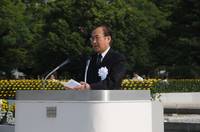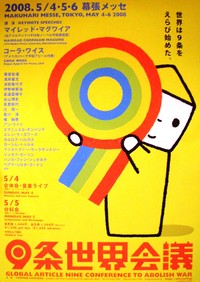SENDING THE TROOPS TO IRAQ IS UNCONSTITUTIONAL says a Japanese High Court
SENDING THE TROOPS TO IRAQ IS UNCONSTITUTIONAL SAYS A JAPANESE HIGH COURT
by Yukari Saito
(translated from Italian into English by Gerry Blaylock)
On 17 th April the Nagoya High Court passed a ruling which many consider “revolutionary”.
The judges declared that “the despatch of the Japanese Self-Defence Forces troops to Iraq and surrounding zones to assist the American Armed Forces is to be considered an integral part of military force used by other countries, therefore it contravenes the first paragraph of article 9 of the Constitution”.
1) Aspiring sincerely to an international peace based on justice and order, the Japanese people forever renounce war as a sovereign right of the nation and the threat or use of force as means of settling international disputes.
2) In order to accomplish the aim of the preceding paragraph, land, sea, and air forces, as well as other war potential, will never be maintained. The right of belligerency of the state will not be recognized.
The paragraph of the Constitution quoted above declares that “... the Japanese people forever renounce war as a sovereign right of the nation and the threat or use of force as means of settling international disputes”. On the basis of this a group of over 3,000 citizens filed an appeal at the Nagoya High Court in February 2004, as many others had done in various cities around the country.
What is extraordinary about this ruling is that over the last few years many similar suits filed by citizens against the State to protest against the government's decisions have always been rejected by the courts, which uphold the legality of the government's actions even when they are in clear contrast with the Constitution or other laws for the protection of citizen's rights.
The Nagoya High Court, however, decided to analyse the real situation in Iraq carefully in all its complexities and from different points of view in order to grasp exactly what the Japanese troops do in that particular context a nd evaluate its real meaning.
The ruling dedicates many pages to a reconstruction of the facts: a fairly complete chronology regarding the war in Iraq together with a lot of data, including figures, and also the use of white phosphorus bombs against civilians. Based on this they ruled that the assistance afforded by the Japanese troops, the Air Self Defence Forces in particular, for the airlifting of American troops and materials which they use in conflict zones is inadmissible both constitutionally and under the temporary law approved in the summer of 2003 to allow the troops to leave for Iraq.
The latter, presented and approved by the government led by Jun'ichiro Koizumi, confines the troops' activities to non -combat zones providing strictly humanitarian support with no connection to military actions undertaken in the operations.
However, according to the judges' analysis in reality the Japanese troops were in a conflict zone and as a result of their assistance many defenceless Iraqi citizens were killed.
Further, the judges also recognised that the plaintiffs' “right to live peacefully” is part of the fundamental rights guaranteed by the Constitution. This was an important victory for the citizens since in the past many suits had been rejected because that very right was not recognised as being actionable by private citizens.
“ I don't want to be forced to be on the same side as the aggressors.”
This was the slogan used by the Japanese citizens when, between January 2004 and March 2005, they filed suits in courts in eleven different cities to stop the despatch of SDF troops to Iraq.
The Nagoya group with 3,268 plaintiffs in all was the largest committee among the existing 12, which were in Hokkaido, Sendai, Tochigi, Tokyo, Yamanashi, Shizuoka, Nagoya, Kyoto, Oka yama, Kumamoto and two groups in Osaka. Each group, large or small, decided their own approach, some deliberately eschewing professional legal assistance, and later on they joined up in a national network.
In Tokyo, for instance, they decided to file around 100 suits - one a day presented by one person in a different office from that to which another group member had gone the previous day: a sort of rally of lawsuits against the State. The aim was to put as many judges as possible in the position of having to make a ruling and, through a face-to-face discussion, lead them to question themselves about whether the despatch of the troops abroad was unconstitutional or not.
In all, over 5,600 citizens assisted by more than 800 lawyers went to courts to contest the despatch of the troops to Iraq, among them a few Iraqi citizens for some time resident in Osaka and an ex- Defence undersecretary.
Each suit was filed to make more or less the following three requests:
-
that the troops be brought back from Iraq;
-
that it be recognised that their despatch was unconstitutional ;
-
that a payment should be made for moral damages (a symbolic sum. In Nagoya, for example, it was of 10,000 yen a head, about £45) or that funds for the mission be frozen.
With the Nagoya High Court ruling of 17th April, which has become final, 8 groups out of 12 have reached the end of their legal battle, while the other 4 (Hokkaido, Sendai, Okayama e Kumamoto) are still battling it out.
But, up to now no court had ruled in the citizens' favour.
Not even the Nagoya High Court, to tell the truth, at least formally. The ruling says that in the present case the plaintiffs are asking for a ruling declaring the illegality of certain facts in such an abstract way as to make it impossible to determine exactly the entity of the rights infringed upon.
Yet the news gave the impression that, even though their demands had been rejected, the citizens had finally obtained a much-longed-for victory. In substance they had with the ruling which, in no uncertain terms, declared the despatch of the troops as unconstitutional, in clear contrast with rulings expressed elsewhere.
However, it is the State which has technically “won” and cannot appeal against the ruling. The plaintiffs “lost” and have decided not to appeal in order to allow the ruling to become final. A paradoxical situation which the citizens welcomed in a positive manner.
Thanks to this ruling and the events on 3 rd May for the Constitution Memorial Day there was a very positive atmosphere compared to recent times. Obviously it was also a hot topic of discussion at the Whynot9 conference near Tokyo 4 th -6 th May.
In the communiqué released by the plaintiffs and lawyers' committee in Nagoya it is stated that: “It is a ruling that would never have been made without the Constitution, and article 9 in particular”, and “It is an important result obtained thanks to the efforts of citizens who wanted to valorize the Constitution”.
The reactions of the government and upper echelons of the Armed Forces dampened the enthusiasm. The immediate reaction of the Premier, Yasuo Fukuda, was: “The State has won, therefore I do not believe that we need to change tack ”, while the Foreign Minister, Masahiko Takamura, replied sarcastically, “I'll have a look at the ruling when I find the time”.
But the most disconcerting reaction was that of the Air-Forc e Commander Toshio Tamogami: “If you want to know my personal opinion it is that I couldn't care less”.
The Secretary-General of the Communist Party, Kazuo Shii , commented on the above during the Constitution Memorial Day: “He couldn't care less about what the Constitution prescribes him to do, doesn't it regard him? What does that mean? It means that the SDF troops have nothing to do with the Constitution, they are lawbreakers. He has confessed the truth”.
However, according to the plaintiffs' committe e of Nagoya: “those who will be happier more than anyone else about this ruling are the soldiers of the SDF and their families because now they have a legally-valid reason for refusing an assignment”.




